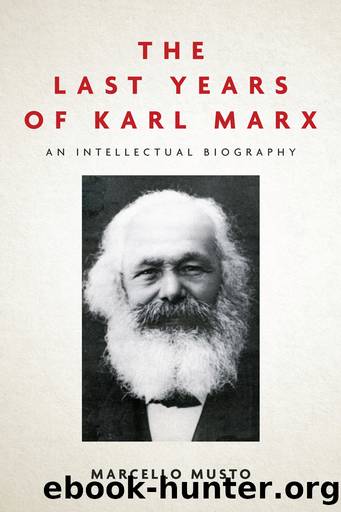The Last Years of Karl Marx by Musto Marcello;Camiller Patrick;

Author:Musto, Marcello;Camiller, Patrick;
Language: eng
Format: epub
Publisher: Stanford University Press
Published: 2020-07-15T00:00:00+00:00
4
THE MOOR’S LAST JOURNEY
1. THE TRIP TO ALGIERS AND REFLECTIONS ON THE ARAB WORLD
After a stormy thirty-four-hour crossing, Marx reached his destination on 20 February. The next day he wrote to Friedrich Engels, and a week later he recalled that his “corpus delecti” had been “frozen to the marrow.” He found an ideally situated room, with a port view, at the Hôtel-Pension Victoria, in the Upper Mustapha zone. It was a “magical panorama,” which allowed him to appreciate the “wonderful combination of Europe and Africa.”1
The only person who knew the identity of the newly arrived polyglot gentleman was Albert Fermé (1840–1904), a justice of the peace and follower of Charles Fourier (1772–1837), who had landed in Algiers in 1870 after a period of imprisonment on account of his opposition to the Second Empire. He was the only real company Marx had there, serving as his guide on various excursions and attempting to satisfy his curiosity about the new world.
As the days passed, however, Marx’s health did not improve: he was still troubled by the bronchitis, and an uncontrollable cough kept him awake at night. The unusually cold, damp, and rainy weather—it was the worst winter in ten years in Algiers—also favored another attack of pleurisy. “The only difference between my clothing in the Isle of Wight and my clothing in the city of Algiers,” he wrote to Engels, “is that in the villa I have up till now simply replaced the rhinoceros greatcoat with my light greatcoat.” He even contemplated moving 400 kilometers further south, to the village of Biskra on the edge of the Sahara, but his poor physical condition dissuaded him from such a taxing journey. He therefore embarked on a lengthy period of complicated treatment in Algiers.
Dr. Charles Stephann (1840–1906), the best in the city, prescribed sodium arsenate during the day and a codeine-based opiate syrup to help him sleep at night. He also ordered Marx to reduce physical exertion to a minimum and to abstain from “real intellectual work except some reading for [his] distraction.” Nevertheless, on 6 March the cough became even more violent and brought about repeated hemorrhaging. Marx was therefore forbidden to leave the hotel and even to engage in conversation: “rest, solitude and silence” were now “duties incumbent on [him] as a citizen.”2 At least, he wrote to Engels, “Dr. Stephann, like my dear Dr. Donkin [in London], does not forget the cognac.”3
The most painful treatment proved to be a course of ten vesicatories, a therapy popular at the time that used agents to blister the skin in order to release subcutaneous toxins. Marx managed to complete these with the help of a young pharmacist. Little by little, by repeatedly painting his chest and back with collodion and opening the resulting blisters, Mr. Maurice Casthelaz (?) succeeded in drawing off the excess fluid from his lungs.
Not surprisingly, Marx began to regret his chosen destination: as he wrote to Paul Lafargue, “from the moment of [his] departure for Marseilles” there had been “the finest weather in both Nice and Menton,” two other possibilities he had considered.
Download
This site does not store any files on its server. We only index and link to content provided by other sites. Please contact the content providers to delete copyright contents if any and email us, we'll remove relevant links or contents immediately.
Hit Refresh by Satya Nadella(8346)
When Breath Becomes Air by Paul Kalanithi(7275)
The Girl Without a Voice by Casey Watson(7273)
Do No Harm Stories of Life, Death and Brain Surgery by Henry Marsh(6343)
A Court of Wings and Ruin by Sarah J. Maas(6119)
Hunger by Roxane Gay(4237)
Shoe Dog by Phil Knight(4185)
Everything Happens for a Reason by Kate Bowler(4076)
A Higher Loyalty: Truth, Lies, and Leadership by James Comey(4042)
The Rules Do Not Apply by Ariel Levy(3915)
Tuesdays with Morrie by Mitch Albom(3842)
The Immortal Life of Henrietta Lacks by Rebecca Skloot(3834)
How to Change Your Mind by Michael Pollan(3689)
Millionaire: The Philanderer, Gambler, and Duelist Who Invented Modern Finance by Janet Gleeson(3576)
All Creatures Great and Small by James Herriot(3528)
Elon Musk by Ashlee Vance(3463)
Tokyo Vice: An American Reporter on the Police Beat in Japan by Jake Adelstein(3447)
Man and His Symbols by Carl Gustav Jung(3329)
The Money Culture by Michael Lewis(3293)
